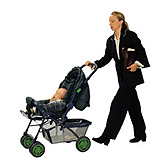- 8 Ways to Increase Dopamine Naturally
- 7 Best Breads for Maintaining Stable Blood Sugar
- Gelatin vs. Collagen: Which is Best for Skin, Nails, and Joints?
- The Long-Term Effects of Daily Turmeric Supplements on Liver Health
- Could Your Grocery Store Meat Be Causing Recurring UTIs?
- Are You Making This Expensive Thermostat Error This Winter?
- Recognizing the Signs of Hypothyroidism
- 10 Strategies to Overcome Insomnia
- Could Artificial Sweeteners Be Aging the Brain Faster?
- Techniques for Soothing Your Nervous System
Millennials More Accepting of Working Moms Than Past Generations


Young Americans are more accepting of working mothers than previous generations were, a new study finds.
Researchers say the views of millennials — those born roughly between 1980 and 2000 — reflect growing gender equality and tolerance in the United States. These attitudes are more consistent with a culture that focuses on individualism rather than adherence to social rules.
“This goes against the popular belief that millennials want to ‘turn back the clock’ or that they are less supportive of working moms because their own mothers worked. Instead, they are more supportive,” study author Jean Twenge, a psychology professor at San Diego State University, said in a university news release.
Nearly 600,000 people responded to two national surveys taken between 1976 and 2013. One survey involved 12th graders in the United States, the other included adults. By comparing the results, researchers hoped to gain a better understanding of how views on American women’s role in the workplace and the family have changed over the past few decades.
Americans entering adulthood around 2000 are more supportive of working moms than previous generations were at that age, the analysis revealed. In the 1970s, the researchers said, 59 percent of high school seniors believed that preschoolers would suffer if their mother worked outside the home. By the 2010s, less than one-quarter of 12th graders felt that way.
Millennials aren’t alone in their acceptance of working mothers. Views have also changed among older adults in the United States. In 1977, more than two-thirds of adults surveyed felt “a preschool child is likely to suffer if his or her mother works.” In 1998, that number dropped to 42 percent, and by 2012, roughly one-third of adults held this view, according to the study published June 29 in Psychology of Women Quarterly.
“In recent years, Americans have become much more supportive of men and women holding the same roles and responsibilities in the workplace as well as in child-rearing,” said the study’s lead researcher, Kristin Donnelly, who was a graduate student at San Diego State when the research was conducted.
“These results suggest a convergence onto a common gender role for both genders as equal parts provider and caretaker, flexibly switching between the two without regard for traditionally gendered conceptions of duty,” Donnelly said in the news release.
Millennials with a more patriarchal view of marriage are among a growing minority, however, the researchers found. The percentage of 12th graders who thought it best for a man to work and a woman to nurture the family rose from 27 percent in the mid-1990s to nearly one-third by 2010-2013. Meanwhile, 14 percent of students thought the husband should make key family decisions in 1995-1996, compared to 17 percent in 2010-2013.
“Millennials might see marriage as only for certain types of people,” said Twenge. “With the marriage rate at an all-time low, today’s young people may believe that marriage is a traditional choice involving more rigid gender roles,” she suggested.
More information
The U.S. Department of Labor provides statistics on women in the workforce.
Source: HealthDay
Copyright © 2026 HealthDay. All rights reserved.










